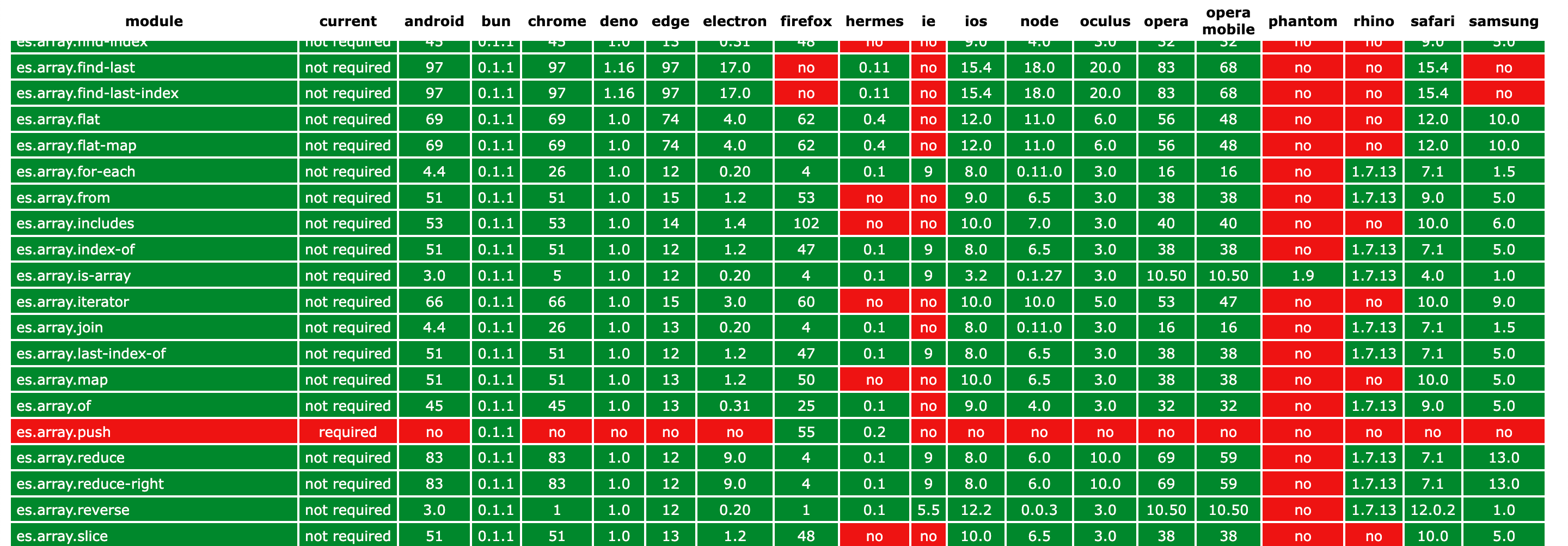Contributions are always welcome. If you don't know how you can help, you can check issues or ask @zloirock.
- The polyfill implementation should be added to the
packages/core-js/modulesdirectory. - Shared helpers should be added to the
packages/core-js/internalsdirectory. Reuse already existing helpers. - For export the polyfill, in all common cases use
internals/exporthelper. Use something else only if this helper is not applicable - for example, if you want to polyfill accessors. - If the code of the pure version implementation should significantly differ from the global version (that's not a frequent situation, in most cases
internals/is-pureis enough), you can add it topackages/core-js-pure/overridedirectory. The rest parts ofcore-js-purewill be copied fromcore-jspackage. - Add the feature detection of the polyfill to
tests/compat/tests.js, add the compatibility data topackages/core-js-compat/src/data.mjs, how to do it see below, and the name of the polyfill module topackages/core-js-compat/src/modules-by-versions.mjs(this data is also used for getting the default list of polyfills at bundling and generation indexes). - Add it to entry points where it's required: directories
packages/core-js/es,packages/core-js/stable,packages/core-js/actual,packages/core-js/full,packages/core-js/proposals,packages/core-js/stageandpackages/core-js/web. - Add unit tests to
tests/testsandtests/pure. - Add tests of entry points to
tests/commonjs.js. - Make sure that you are following our coding style and all tests are passed.
- Document it in README.md and CHANGELOG.md.
For updating core-js-compat data:
- If you want to add a new data for a browser, run in this browser
tests/compat/index.html(tests and results for the actual release are available athttp://zloirock.github.io/core-js/compat/) and you will see whatcore-jsmodules are required for this browser.
- If you want to add new data for NodeJS, run
npm run compat-nodewith the installed required NodeJS version and you will see the results in the console. Usenpm run compat-node -- jsonif you want to get the result as JSON. - If you want to add new data for Deno, run
npm run compat-denowith the installed required Deno version and you will see the results in the console. Usenpm run compat-deno -- jsonif you want to get the result as JSON. - If you want to add new data for Bun, run
npm run compat-bunwith the installed required Bun version and you will see the results in the console. - If you want to add new data for Rhino, set the required Rhino version in
compat-rhino-prepareNPM script inpackage.json, runnpm run compat-rhinoand you will see the results in the console. - If you want to add new data for Hermes, run
npm run compat-hermes -- YOR_PATH_TO_HERMESand you will see the results in the console. - After getting this data, add it to
packages/core-js-compat/src/data.mjs. - If you want to add new mapping (for example, to add a new iOS Safari version based on Safari or NodeJS based on Chrome), add it to
packages/core-js-compat/src/mapping.mjs.
| engine | how to run tests | base data inherits from | mandatory check | mapping for a new version |
|---|---|---|---|---|
android |
browser runner | chrome |
||
bun |
bun runner | required | ||
chrome |
browser runner | required | ||
deno |
deno runner | chrome (only ES) |
non-ES features | required |
edge |
browser runner | ie, chrome |
required | |
electron |
browser runner | chrome |
required | |
firefox |
browser runner | required | ||
hermes |
hermes runner | required | ||
ie |
browser runner | required | ||
ios |
browser runner | safari |
if inconsistent (!= safari) | |
node |
node runner | chrome (only ES) |
non-ES features | required |
oculus |
browser runner | android (-> chrome) |
required | |
opera |
browser runner | chrome |
if inconsistent (!= chrome - 14) | |
opera_mobile |
browser runner | opera, chrome |
required | |
phantom |
browser runner | safari |
||
rhino |
rhino runner | required | ||
safari |
browser runner | required | ||
samsung |
browser runner | chrome |
required |
If you have no access to all required browsers / versions of browsers, use Sauce Labs, BrowserStack or Cloud Browser.
The coding style should follow our .eslintrc. You can test it by calling npm run lint. Different places have different syntax and standard library limitations:
- Polyfill implementations should use only ES3 syntax and standard library, they should not use other polyfills from the global scope.
- Unit tests should use the modern syntax with our minimalistic Babel config. Unit tests for the pure version should not use any modern standard library features.
- Tools, scripts and tests, performed in NodeJS, should use only the syntax and the standard library available in NodeJS 8.
File names should be in the kebab-case. Name of polyfill modules should follow the naming convention namespace.subnamespace-where-required.feature-name, for example, esnext.set.intersection. The top-level namespace should be es for stable ECMAScript features, esnext for ECMAScript proposals and web for other web standards.
Before testing, you should install dependencies:
$ npm iYou can run all tests by
$ npm run testYou can run parts of the test case separately:
- Linting:
$ npm run lint
- The global version unit tests:
$ npm run test-unit-global-standalone
- The pure version unit tests:
$ npm run test-unit-pure-standalone
- Promises/A+ and ES6
Promisetest cases:$ npm run test-promises-standalone
- ECMAScript
Observabletest case:$ npm run test-observables-standalone
- CommonJS entry points tests:
$ npm run test-entries-standalone
- If you want to run tests in a certain browser, at first, you should build packages and test bundles:
$ npm run bundle-standalone
- For running the global version of the unit test case, use this file:
tests/tests.html - For running the pure version of the unit test case, use this file:
tests/pure.html
